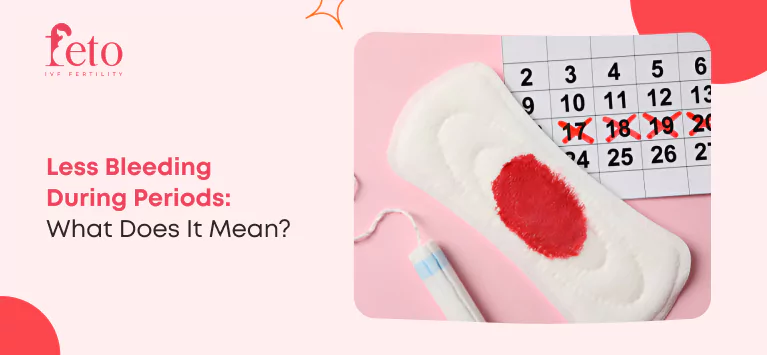
Less Bleeding During Periods: What Does It Mean?
When it comes to menstrual health, every woman’s cycle is unique. But if you’ve ever wondered, “Why is there less blood during my periods?” or “Is it normal if bleeding is less during periods?”, you’re not alone. Light periods, medically known as hypomenorrhea, refer to less bleeding during menstruation.
In this article, we’ll explore what light periods mean, the causes of less bleeding during periods, and when it might be a sign to seek medical advice. Let’s dive into everything you need to know about this often-overlooked topic.
What Is Considered a Light Period?
A light period is generally defined as having significantly less blood during menstruation than usual. This could mean:
- Shorter duration of menstrual flow (e.g., only 1-2 days)
- Lighter flow (e.g., spotting or light bleeding instead of a full flow)
- Less need for sanitary products (e.g., only needing one or less than one pad a day)
Some women may naturally have lighter periods, and that can be perfectly normal. However, if bleeding is less during periods suddenly or consistently, it may be worth understanding the reasons behind the change.
Causes of Less Bleeding During Periods
There are multiple factors—both natural and medical—that can lead to less blood during periods. Here are some of the most common less bleeding during periods reasons:
1. Hormonal Imbalances
Estrogen and progesterone help maintain the balance and timing of your menstrual cycle. When these hormones fluctuate, it can affect the thickness of the uterine lining, resulting in less bleeding during periods. Common causes of hormonal imbalance include:
- Thyroid disorders
- PCOS (Polycystic Ovary Syndrome)
- Stress or anxiety
- Perimenopause
2. Birth Control and Contraceptives
Using hormonal birth control methods like pills, patches, IUDs, or implants often results in lighter periods. Some women may even stop having periods altogether while using them, which is generally safe under medical supervision.
3. Pregnancy
Though rare, some women experience light bleeding or spotting during early pregnancy. This might easily be confused with a light period. If you’re sexually active and notice less blood during your menstruation, taking a pregnancy test is a wise move.
4. Extreme Weight Loss or Eating Disorders
Sudden or excessive weight loss can disrupt your menstrual cycle. This happens because the body doesn’t produce enough estrogen to maintain a normal uterine lining, leading to less bleeding during menstruation.
5. Over-Exercising
Athletes or those who engage in intense physical activity might notice less blood during periods. This condition, often seen in runners and gymnasts, is due to changes in energy balance and hormonal function.
6. Age and Perimenopause
As you approach menopause, your periods may become irregular and lighter. Perimenopause, the transitional stage before menopause, often includes light periods as the body prepares to stop menstruating altogether.
7. Uterine Scarring (Asherman’s Syndrome)
This rare condition involves scarring in the uterus, often due to surgical procedures like D&C (dilation and curettage). It can lead to light or missed periods.
8. Chronic Health Conditions
Conditions like diabetes, liver disease, or celiac disease can also affect your menstrual cycle. These systemic issues may contribute to less bleeding during periods over time.
Should You Be Worried About Light Periods?
In most cases, less bleeding during periods is not a cause for concern. It’s vital to understand the situation as a whole. If your light periods are accompanied by:
- Unusual pain
- Missed periods
- Sudden weight changes
- Fatigue or dizziness
- Irregular cycles
It’s best to consult a healthcare provider. Such signs may reveal an underlying problem that needs medical evaluation.
If Bleeding Is Less During Periods, What Can You Do?
If you’re noticing less blood during your periods, here are some steps you can take:
1. Track Your Cycle
Use a period tracker app to monitor changes in your flow, duration, and symptoms. This helps you detect patterns and provides valuable information to your doctor.
2. Get Hormone Levels Checked
A blood test can determine if a hormonal imbalance is responsible for your less bleeding during menstruation.
3. Evaluate Lifestyle Factors
Consider if stress, diet, or exercise habits have changed recently. Making minor lifestyle improvements can promote cycle regularity.
4. Check Your Medications
If you’ve recently started or changed medications, especially birth control, it could be the reason for less blood during periods.
5. Consult a Gynecologist
If you’re concerned, it’s always wise to speak to a healthcare professional. They can rule out any serious conditions and guide you on next steps.
Natural Remedies to Improve Menstrual Flow
If your doctor confirms that your light periods aren’t due to a medical condition, you might consider natural ways to promote a healthy menstrual flow:
- Eat iron-rich foods like spinach, lentils, and red meat
- Stay hydrated
- Practice stress-reducing activities like yoga or meditation
- Avoid over-exercising
- Maintain a healthy body weight
Such habits promote balanced hormones and support your reproductive system.
Final Thoughts
Light periods or less bleeding during menstruation are common and usually not a sign of a serious issue. Whether caused by hormonal shifts, lifestyle factors, or medications, it’s essential to understand your own body’s patterns.
If your period suddenly becomes lighter or irregular, it’s a good idea to seek medical advice to rule out any underlying conditions.
Remember, your menstrual cycle is a vital sign of your health. Keeping track of changes and staying informed empowers you to take charge of your well-being.
Frequently Asked Question
What does it mean if bleeding is less during periods?
It may be due to hormonal imbalances, stress, contraceptives, or approaching menopause. It’s usually not serious but should be monitored.
Is less bleeding during periods normal?
Yes, in many cases. However, if it’s a new change or comes with other symptoms, consult a doctor.
Can less blood during menstruation mean pregnancy?
Yes, at times, light spotting can be an early sign of pregnancy. Take a test to confirm.
